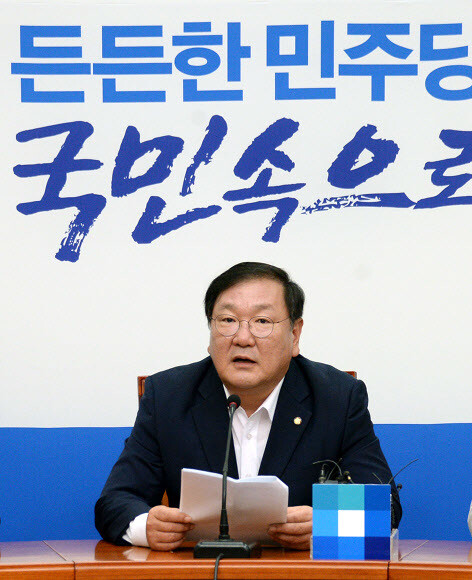hankyoreh
Links to other country sites 다른 나라 사이트 링크
Ruling party approves social welfare increases

On Aug. 16, the South Korean government and the ruling party decided to start paying a childcare allowance of 100,000 (about US $100) in July 2018 and to increase the basic pension to 250,000 (about US $250) won as of April 2018.
Kim Tae-nyeon, chair of the Minjoo Party of Korea’s policy committee, made the announcement in the National Assembly following deliberations between the Minjoo Party, the government and the Blue House. The childcare allowance will be paid to children between the ages of 0 and 5 regardless of the income level of their guardian, with the payment period capped at 72 months.
“In 2018, it’s estimated that a monthly average of 2.53 million children will receive benefits,” Kim said. “While the 100,000 won allowance will generally be paid in cash, payment in community vouchers will also be an option, depending on the circumstances of the local government body.”
The party and government estimate that this program will cost 1.5 trillion won next year. To make this a reality, the Minjoo Party is planning to push for the adoption of childcare allowance legislation by the end of the year.
The party and government also agreed to increase the basic pension from its current monthly maximum of 200,000 (US $200) to 250,000 (US $250) starting in April 2018 and to gradually increase the monthly payments to 300,000 (US $300) by April 2021. The basic pension is paid to individuals at least 65 years of age who fall in the lower 70% of income earners. The payment increase is estimated to cost an additional 5.9 trillion won (about US $5.9 billion) over the next five years.
“Raising the basic pension will decrease the relative poverty rate among the elderly to 44.6% in 2018 and to 42.4% in 2021, or two to four points lower than the current rate of 46.5%,” Kim predicted. While basic pension payments currently range from 100,000 to 200,000 according to how long the beneficiary has been enrolled in the national pension program, the party and government are planning to eliminate these differences and make the payments uniform.
“We will be working to eliminate the pension-linked reductions after carrying out a full review of all the public pension systems during the fourth round of fiscal calculations for the national pension program next year. Toward that end, we’ll be pushing to revise the Basic Pension Act and secure the related funds,” Kim added.
The government and party also decided to set up a “job stability fund” to help small business owners who are likely to struggle when the minimum wage goes up next year. “Establishing the job stability fund will reduce the burden by more than four trillion won (about US $4 billion) altogether, including three trillion won (about US $3 billion) in direct funding for labor costs and one trillion won (about US $1 billion) to improve business conditions,” said Park Wan-ju, senior spokesperson for the Minjoo Party.
By Kim Kyu-nam, staff reporter
Please direct questions or comments to [english@hani.co.kr]

Editorial・opinion
![[Guest essay] The real reason Korea’s new right wants to dub Rhee a founding father [Guest essay] The real reason Korea’s new right wants to dub Rhee a founding father](https://flexible.img.hani.co.kr/flexible/normal/500/300/imgdb/original/2024/0423/8317138574257878.jpg) [Guest essay] The real reason Korea’s new right wants to dub Rhee a founding father
[Guest essay] The real reason Korea’s new right wants to dub Rhee a founding father![[Column] ‘Choson’: Is it time we start referring to N. Korea in its own terms? [Column] ‘Choson’: Is it time we start referring to N. Korea in its own terms?](https://flexible.img.hani.co.kr/flexible/normal/500/300/imgdb/original/2024/0423/3617138579390322.jpg) [Column] ‘Choson’: Is it time we start referring to N. Korea in its own terms?
[Column] ‘Choson’: Is it time we start referring to N. Korea in its own terms?- [Editorial] Japan’s rewriting of history with Korea has gone too far
- [Column] The president’s questionable capacity for dialogue
- [Column] Are chaebol firms just pizza pies for families to divvy up as they please?
- [Column] Has Korea, too, crossed the Rubicon on China?
- [Correspondent’s column] In Japan’s alliance with US, echoes of its past alliances with UK
- [Editorial] Does Yoon think the Korean public is wrong?
- [Editorial] As it bolsters its alliance with US, Japan must be accountable for past
- [Guest essay] Amending the Constitution is Yoon’s key to leaving office in public’s good graces
Most viewed articles
- 1[Column] ‘Choson’: Is it time we start referring to N. Korea in its own terms?
- 2Senior doctors cut hours, prepare to resign as government refuses to scrap medical reform plan
- 3Why Korea shouldn’t welcome Japan’s newly beefed up defense cooperation with US
- 4Opposition calls Yoon’s chief of staff appointment a ‘slap in the face’
- 5[Guest essay] The real reason Korea’s new right wants to dub Rhee a founding father
- 6Terry Anderson, AP reporter who informed world of massacre in Gwangju, dies at 76
- 7[Column] The clock is ticking for Korea’s first lady
- 8[Editorial] Japan’s rewriting of history with Korea has gone too far
- 9New AI-based translation tools make their way into everyday life in Korea
- 10Survey: S. Koreans spend more time using smartphones than eating